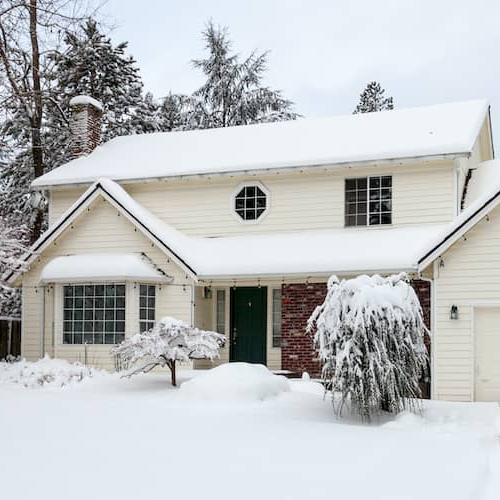Property taxes by state: Ranked from highest to lowest in 2025
Contributed by Tom McLean
Sep 12, 2025
•7-minute read

If you’re a homebuyer or homeowner, property taxes can significantly affect the cost of owning a home. So, if you’re budgeting for a mortgage, understanding your property tax obligation and how it can vary is vital. After all, a $400,000 house in one state could cost you thousands more a year than the same-priced home in another.
What are property taxes?
Property taxes are levied by cities, counties, and school districts in every state. Property taxes are an annual, ongoing tax determined by the assessed value of your home or land. Property taxes are also usually tax-deductible on your federal tax return.
Property taxes fund services that keep communities running. They help pay for public schools, law enforcement, emergency services, parks, road repairs, sanitation, and more.
Your local tax assessor calculates your property tax using formulas determined by the state. They do this by giving your property an assessed value, which is not the same as your home’s market value, and then applying what’s known as a mill rate, which is a tax rate expressed in thousandths. So, for example, if the mill rate is 20, you’ll pay $20 for every $1,000 of assessed value of your home.
What are property taxes based on?
Property taxes are calculated using two main variables: the assessed value of your property and the mill rate.
Assessed value
The assessed value of your home or land is not always the same as its market value. Instead, assessors give your property an assessed value to calculate your property tax. Depending on your state and county, this could vary significantly. Some states set the assessed value as low as 10% of the market value, while others put it at 100%.
Mill rate
The simplest way to think of the mill rate – or millage rate – is that each mill equals $1 for every $1,000 of assessed value. So, if your home has an assessed value of $400,000 and your mill rate is 22.3, your property taxes will be $8,920 per year – 2.23% of $400,000.
Of course, when people speak of property taxes, they speak in percentages. Those percentage rates are directly tied to the mill rate. For example, New Jersey has the highest property taxes in the country, with an effective rate of 2.23%. This reflects the state’s mill rate of 22.3.
Variation
Due to the sometimes significant differences in assessment ratios and mill rates from state to state, homes with the same market value in different states can have dramatically different property tax bills.
States ranked by property tax rate
Property taxes vary from state to state. Where does yours rank? Here is the effective tax rate for every state, using 2023 data, the latest available.
| Rank | State |
Effective tax rate |
Property tax for $303,400 home* |
State's median home value |
Annual property tax for median home value |
|---|---|---|---|---|---|
|
1 |
New Jersey | 2.23% | $6,770 | $427,600 | $9,541 |
|
2 |
Illinois | 2.07% | $6,285 | $250,500 | $5,189 |
| 3 | Connecticut | 1.92% | $5,813 | $343,200 | $6,575 |
| 4 | New Hampshire | 1.77% | $5,375 | $367,200 | $6,505 |
| 5 | Vermont | 1.71% | $5,176 | $290,500 | $4,956 |
| 6 | New York | 1.60% | $4,856 | $403,000 | $6,450 |
| 7 | Texas | 1.58% | $4,790 | $260,400 | $4,111 |
| 8 | Wisconsin | 1.51% | $4,594 | $247,400 | $3,746 |
| 9 | Nebraska | 1.50% | $4,542 | $223,800 | $3,350 |
| 10 | Iowa | 1.43% | $4,329 | $195,900 | $2,795 |
| 11 | Ohio | 1.36% | $4,131 | $199,200 | $2,712 |
| 12 | Pennsylvania | 1.35% | $4,089 | $240,500 | $3,241 |
| 13 | Rhode Island | 1.32% | $3.993 | $368,800 | $4,854 |
| 14 | Kansas | 1.30% | $3,942 | $203,400 | $2,643 |
| 15 | Michigan | 1.28% | $3,897 | $217,600 | $2,795 |
| 16 | Alaska | 1.14% | $3,445 | $333,300 | $3,785 |
| 17 | Massachusetts | 1.11% | $3,354 | $525,800 | $5,813 |
| 18 | Maine | 1.10% | $3,332 | $266,400 | $2,926 |
| 19 | South Dakota | 1.09% | $3,318 | $236,800 | $2,590 |
| 20 | Minnesota | 1.04% | $3,162 | $305,500 | $3,184 |
| 21 | Maryland | 1.00% | $3,043 | $397,700 | $3,989 |
| 22 | North Dakota | 0.99% | $3,010 | $241,100 | $2,392 |
| 23 | Missouri | 0.88% | $2,655 | $215,600 | $1,887 |
| 24 | Washington | 0.84% | $2,545 | $519,800 | $4,361 |
| 25 | Oregon | 0.83% | $2,516 | $454,200 | $3,767 |
| 26 | Oklahoma | 0.82% | $2,481 | $185,900 | $1,520 |
| 27 | Georgia | 0.81% | $2,461 | $272,900 | $2,214 |
| 28 | Florida | 0.79% | $2,385 | $325,000 | $2,555 |
| 29 | Kentucky | 0.77% | $2,322 | $192,300 | $1,472 |
| 30 | Montana | 0.75% | $2,275 | $338,100 | $2,535 |
| 31 | Indiana | 0.74% | $2,251 | $201,600 | $1,496 |
| 32 | Mississippi | 0.74% | $2,235 | $161,400 | $1,189 |
| 33 | Virginia | 0.74% | $2,259 | $360,700 | $2,686 |
| 34 | New Mexico | 0.72% | $2,181 | $232,200 | $1,669 |
| 35 | California | 0.71% | $2,149 | $695,400 | $4,926 |
| 36 | North Carolina | 0.70% | $2,123 | $259,400 | $1,815 |
| 37 | District of Columbia | 0.58% | $1,750 | $724,600 | $4,180 |
| 38 | Wyoming | 0.58% | $1,765 | $285,100 | $1,659 |
| 39 | Arkansas | 0.57% | $1,736 | $175,300 | $1,003 |
| 40 | Tennessee | 0.55% | $1,654 | $256,800 | $1,400 |
| 41 | Louisiana | 0.55% | $1,666 | $208,700 | $1,146 |
| 42 | West Virginia | 0.54% | $1,628 | $155,600 | $835 |
| 43 | Delaware | 0.53% | $1,607 | $326,800 | $1,731 |
| 44 | Idaho | 0.53% | $1,619 | $376,000 | $2,006 |
| 45 | Utah | 0.53% | $1,608 | $455,000 | $2,412 |
| 46 | Arizona | 0.52% | $1,571 | $358,900 | $1,858 |
| 47 | South Carolina | 0.51% | $1,537 | $236,700 | $1,199 |
| 48 | Nevada | 0.49% | $1,472 | $406,100 | $1,970 |
| 49 | Colorado | 0.49% | $1,479 | $502,200 | $2,448 |
| 50 | Alabama | 0.38% | $1,148 | $195,100 | $738 |
| 51 | Hawaii | 0.27% | $820 | $808,200 | $2,183 |
Why do property tax rates vary so much?
Property tax rates are tied to local and state services like public education, road maintenance, police, and more. For example, in states like New Jersey, public schools rely heavily on property taxes. That explains why the Garden State has the highest tax rate in the nation. In Hawaii, which has the lowest property tax rates in the country, schools aren’t funded by property taxes, so the rate is lower.
Home values also play a part in the amount needed from property taxes. States with higher average home prices, such as Hawaii, can generate the same revenue with a lower property tax rate than states with lower average home values.
A few other things can affect your property taxes. Some states reassess every year, for instance, while others reassess less frequently. Still others reassess only when a property changes hands or undergoes major renovations. Some states also have rate caps, which limit how much your property taxes can increase.
State property tax exemptions
Many states offer property tax exemptions for specific homeowners or properties.
- Veterans: These property tax exemptions are offered to disabled veterans or those with military service.
- Seniors: Many states give property tax relief to seniors over a certain age, commonly 65. This exemption may also come with an income limit.
- Disabled: People with permanent disabilities often qualify for property tax exemptions.
- Homestead: In states with a homestead exemption, a homeowner’s property taxes are reduced, often by a percentage or up to a certain amount. Different states have varying criteria and rules, but this is a common exemption for primary residences.
If you think you qualify for a property tax exemption, visit your local tax assessor’s website. You’ll likely need to fill out a form and document your eligibility for the exemption. You might also need to do this by a specific date, or every year. Each state and locality has its own rules.
How property taxes affect home affordability
When considering home affordability, it’s easy to concentrate only on the price of a house and the mortgage interest rate. But property taxes can be a make-or-break factor, so you should consider them carefully.
For example, let’s say you’re thinking of relocating to another state. You’ve narrowed it down to New Jersey and South Carolina and plan to buy a $400,000 home. New Jersey has an average effective property tax rate of 2.23%; South Carolina's is 0.51%. So, for a home of the same price, you’ll pay $8,920 in property taxes in New Jersey, but only $2,040 in South Carolina.
Now, if your lender includes property taxes in your monthly mortgage payment, a common practice, your New Jersey home’s monthly payment will be $573 higher than South Carolina’s. This also affects your debt-to-income ratio and might mean you can’t qualify for as high a loan amount.
For this reason and more – such as states’ varying exemption policies – it pays to research property taxes in the state and county you plan to buy a home in.
FAQs
Which state has the highest property taxes in 2025?
As of the latest data available, New Jersey has the highest effective property tax rate in the nation at 2.23%. The median annual property tax payment is $9,541.
Do property taxes go up every year?
Not always, but they can. Property taxes increase if your property’s assessed value increases. However, different states have different rules about when reassessments happen and why. Some are annual, some are not.
Can you appeal your property tax assessment?
Yes, if you believe your property received an assessment that was too high, you can file an appeal. But you’ll have to follow your state’s rules on how to file an appeal and provide proof of your assertions, such as an independent appraisal.
Are property taxes included in a mortgage payment?
Yes, lenders often require you to pay property taxes, amortized, by the month. They set up a separate escrow account for this money, which pays your property taxes annually. That way, it ensures your property taxes are paid on time, without you having to scramble to raise thousands of dollars at once. It protects them and you. And, like the interest on your mortgage, they are one of many homeowner tax deductions.
What happens if you don’t pay property taxes?
The consequences of unpaid property taxes can be severe. Failure to pay can result in penalties, interest charges, and, potentially, a tax lien on your property. This could result in a tax sale, in which you lose your property.
The good news is that there is plenty of help if you think you might fall behind on your property taxes. Many states offer grace periods, payment plans, or even deferrals. The important thing is to contact your local tax authority the moment you believe you might not be able to pay your taxes on time.
The bottom line: Property taxes vary by state
Property taxes are both unavoidable and an important factor in calculating the cost of homeownership. And because they vary so much from state to state, it’s important to research local property tax rates in the area you plan to buy a home. They can affect the amount of loan you qualify for and the amount of home you can afford.
Fortunately, you can plan for all of this by getting preapproved for a mortgage. It will factor in property taxes and tell you exactly how much you can comfortably afford. That way, you won’t have any surprises as you settle into your new home.
Rocket Mortgage is a leader in this space and can help you explore all your options, making your home search and homebuying experience surprise- and stress-free. Start your mortgage approval process online or give us a call at (833) 326-6018.

Joel Reese
Joel Reese is a freelance writer who has written about real estate, higher education, sports, and myriad other subjects. He has been published in The Best American Sports Writing series, Details, Spin, Texas Monthly, Huffington Post, Chicago magazine, and many other outlets. His website, ReeseWrites.net, features several samples of his work.
Related resources

6-minute read
What is assessed value and how is it determined?
Learn what assessed value means, how it's calculated, and how it affects property taxes. Know the differences between assessed, appraised, and market values.
Read more

7-minute read
How to claim the property tax deduction: A helpful guide
If you're a homeowner, you can claim a property tax deduction up to $10,000 ($5,000 if you're married and filing separately). Read this comprehensive guide befo...
Read more

5-minute read
8 tax deductions for homeowners: Your breaks and benefits
If you own your home, you can save money when on income tax by deducting specific expenses. Get the most value from your home with these 8 tax deductions.
Read more